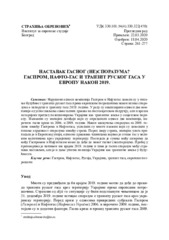Наставак гасног (не)споразума? Гаспром, Нафтогас и транзит руског гаса у Европу након 2019.
Continued gas (dis)agreement? Gazprom, Naftogaz and transit of Russian gas to Europe after 2019
| dc.creator | Obrenović, Strahinja | |
| dc.date.accessioned | 2023-10-09T12:49:45Z | |
| dc.date.available | 2023-10-09T12:49:45Z | |
| dc.date.issued | 2020 | |
| dc.identifier.issn | 1820-4589 | |
| dc.identifier.uri | http://rfpn.fpn.bg.ac.rs/handle/123456789/1044 | |
| dc.description.abstract | Нарушени односи компанија Гаспром и Нафтогас довели су у питање будућност транзита руског гаса према европским потрошачима након истека споразума о испоруци и транзиту гаса 2019. године. У раду су анализирани односи две компаније од успостављања самосталних држава на постсовјетском подручју, али и кратак историјски преглед позиционирања Украјине као транзитне земље у совјетском периоду. Изложени су значајни догађаји који су определили односе две компаније, нарочито гасне кризе из 2006. и 2009. године. Након закључења споразума из 2009. године између Гаспрома и Нафтогаса, уследили су многи изазови који су доводили у питање одрживост споразума између страна. Поред двеју страна, значајна улога припадала је и Европској унији, односно државама чланицама којима је стизао гас у великим количинама кроз украјинску територију. Постојала је сумња међу актерима да међу Гаспромом и Нафтогасом може да дође до новог гасног (не)споразума. Пробој у преговорима је начињен тек крајем 2019. године и тиме је гасни споразум међу странама настављен, али је и даље упитна позиција Украјине као транзитне земље у будућности. | sr |
| dc.description.abstract | Worsened relations between Gazprom and Naftogaz have questioned the future gas transit to European consumers following the expiration of gas supply and transit agreement in 2019. In this paper we are analyzing the relations of the two companies since the establishment of independent countries in the post-Soviet area, and we provide brief historical overview of Ukraine's positioning as a gas transit land in the Soviet period. Significant events are elaborated which defined the relations between the two companies, especially since the gas crisis in 2006 and 2009. Following the conclusion of agreements between Gazprom and Naftogaz in 2009, there were still many challenges that call into question sustainability of the agreement between the parties. In addition, a significant role belonged to the European Union and its Member States, which were receiving large quantities of gas through the territory of Ukraine. There was a suspicion among actors that new gas (dis)agreement could occur between Gazprom and Naftogaz. The breakthrough in the negotiations was only made at the end of 2019, so the gas agreement between the parties continues, but Ukraine's position as a gas transit country in the future remains questionable. | sr |
| dc.language.iso | sr | sr |
| dc.publisher | Нови Сад : Култура – Полис | sr |
| dc.publisher | Београд : Институт за европске студије | sr |
| dc.rights | openAccess | sr |
| dc.rights.uri | https://creativecommons.org/licenses/by/4.0/ | |
| dc.source | Kultura polisa | sr |
| dc.subject | Гаспром | sr |
| dc.subject | Нафтогас | sr |
| dc.subject | Русија | sr |
| dc.subject | Украјина | sr |
| dc.subject | транзит гаса | sr |
| dc.subject | европски потрошачи | sr |
| dc.subject | Gazprom | sr |
| dc.subject | Naftogaz | sr |
| dc.subject | Russia | sr |
| dc.subject | Ukraine | sr |
| dc.subject | gas transit | sr |
| dc.subject | European consumers | sr |
| dc.title | Наставак гасног (не)споразума? Гаспром, Нафтогас и транзит руског гаса у Европу након 2019. | sr |
| dc.title | Continued gas (dis)agreement? Gazprom, Naftogaz and transit of Russian gas to Europe after 2019 | sr |
| dc.title | Nastavak gasnog (ne)sporazuma? Gasprom, Naftogas i tranzit ruskog gasa u Evropu nakon 2019. | sr |
| dc.type | article | sr |
| dc.rights.license | BY | sr |
| dc.citation.epage | 277 | |
| dc.citation.issue | 42 | |
| dc.citation.rank | M51 | |
| dc.citation.spage | 261 | |
| dc.citation.volume | 17 | |
| dc.identifier.fulltext | http://rfpn.fpn.bg.ac.rs/bitstream/id/2795/fulltext.pdf | |
| dc.identifier.rcub | https://hdl.handle.net/21.15107/rcub_rfpn_1044 | |
| dc.type.version | publishedVersion | sr |

